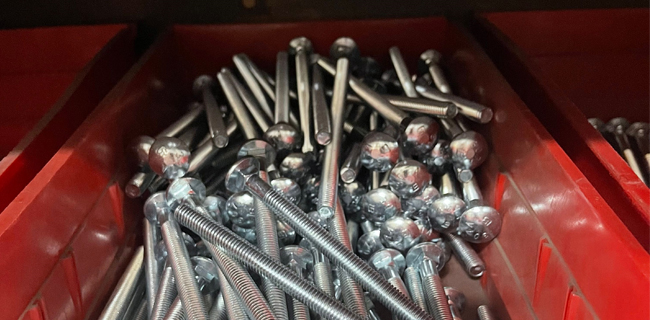Fasteners are often the least expensive component in manufacturing and assembly, but often the most critical. Unfortunately, they are most often overlooked when it comes to purchasing.
The screws, bolts, nails, rivets, threaded inserts, and staples you choose must be based on the application as well as your industry’s specific fastener regulations.
It’s one thing to choose the wrong gauge staple for upholstery fastening. It’s another to select the wrong bolt for a heavy-duty application like constructing buildings or bridges. In both scenarios, however, failure can cost the company time, money and their reputation.
Not taking the time to evaluate your fastener selection can result in:
- Premature failure
- Diminished load strength
- Higher material costs
- Shortened fastener life
- Voided warranties
- Higher labor and repair costs
- Worker safety risks
Related: How To Select High-Performance Industrial Fasteners For Stronger, Safer Connections
Have questions on improving the safety and efficiency of your operation?
Give us a call at 314-638-6500 OPTION 4.
7 Factors to Consider when Selecting the Right Fastener
According to Grand View Research, the fasteners market is forecasted to reach $134.2 billion by 2025. This is partly due to record high demand for automotive, construction, machine manufacturing, electronics, shipbuilding and railways.
That’s great insight but what does that mean for you?
It means that there will be more and more suppliers entering the marketplace with varying levels of product knowledge and product quality. For that reason, we want to arm you with as much information as possible for you to make the best decision for your needs. Before selecting the fastening components required for your job, we recommend considering:
1) How will the fastener be used?
Each fastener serves a unique purpose. Choosing the one designed for the job will improve the performance, safety and life of the connection. Before selecting a fastener, we recommend identifying the following:
Where will the fastener be used?
- Automotive
- Electronics
- Construction
- Structural construction
- Furniture assembly
- Industrial machinery
What are your needs?
- Easy removal
- Easy installation
- Grip strength
- Space limitations
What are your project needs?
- Strength and durability
- Torque
- Impact resistance
- Temperature resistance
- Corrosion resistance
- Vibration resistance
- Chemical resistance
- Appropriate for electrical applications
2) Where will the fastener be used?
Different types of industrial fasteners are designed specifically for use in different materials ranging from wood, metal, plastics or fabric. Their holding power and durability can be impacted by environmental and physical limitations of that material. Consider if the fastener assembly will be exposed to factors like extreme temperatures, sunlight, moisture, saltwater or physically demanding environments.
3) Are there any regulations or standards that pertain to that application?
The American Society of Mechanical Engineers (ASME) currently has 66 active published standards under the B18 designator for fasteners. The quality-focused standards “establish in-process and final inspection requirements for fastener products” and provide a “receiving inspection plan for fastener purchasers.”
Be sure to consult with an engineer to determine your compliance requirements.
4) What materials should your fastener be constructed from?
Fasteners can be made from a variety of materials including steels (stainless steel, carbon steel, alloy steel), aluminum, titanium, copper, brass, nickel, plastics and various alloys.
- Steel fasteners are commonly used due to their high tensile strength and durability.
- Bronze may be ideal for corrosive marine environments.
- Brass provides excellent corrosion resistance.
- Aluminum is lightweight.
- Nylon may be a good choice for applications involving electrical currents as it doesn’t conduct electricity.
5) Are there coating requirements for this application?
Fasteners may also be coated with other materials for added functionality. For example, coatings can offer corrosion resistance or electrical insulation. The most common coatings and platings include chrome and zinc.
6) What strength requirements does your application require?
Not all fastener types deliver the strength and performance your job requires. Before selecting a fastener be sure to evaluate your job needs. Review:
- Tensile strength: Amount of tension before it breaks
- Fatigue strength: How many times can a fastener be stressed before failure?
- Shear strength: How much load can the fastener handle at a right angle?
- Torsion: How much torque can be applied before failure?
7) Who can be your trusted supplier?
No matter what kind of manufacturing or assembly business you have, finding the right supplier for your needs can make or break your operation. It’s easy to get swept away by the lowest price, but rest assured, you get what you pay for. Choosing a supplier based on cost alone often results in inferior parts, the wrong parts or excessive lead times.
Protect your business by selecting a supplier with a known track record. Ask for customer references to learn about supplier’s knowledge, responsiveness, delivery record and problem-solving capabilities.
We understand you have a lot on your plate and may require assistance when choosing fastener assemblies right for your job. We’re here to help.
Related: How Do I Choose The Right Bolt? Bolt Selection Tips From Superior Industrial Supply
Give us a call at 314-638-6500 OPTION 4 and speak to a knowledgeable representative today!
Superior Industrial Supply knows how important it is to have durable and reliable equipment for your most demanding applications. It’s why we specialize in fastener selection, hydraulic hose assembly and repairs. Give us a call at 314-638-6500 OPTION 4 or 800-783-6501 and let us know how we can help you find the products, services and advice you need to do just that.

